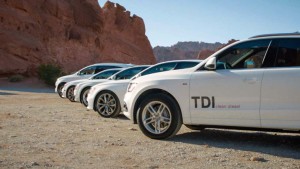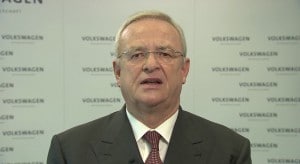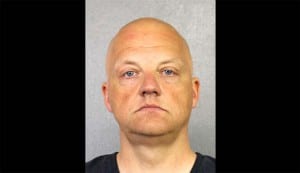
One of the ironies of Stadler’s indictment in the VW diesel scandal is that he was an active proponent of battery-car technology, the former Audi CEO shown her with an early e-tron concept.
Rupert Stadler, the former CEO of Audi, has become the latest executive to be charged for his alleged role in the Volkswagen diesel emissions scandal.
Stadler and three other defendants will face charges that include fraud, false certification and criminal advertising practices, according to German authorities. In April, prosecutors in the city of Braunschweig charged former Volkswagen AG CEO Martin Winterkorn with fraud for his role in attempting to rig diesel emissions tests.
So far, more than a dozen people have been indicted in the United States and Germany in connection with the scandal that was first revealed by the U.S. Environmental Protection Agency in September 2015. VW has also spent about 30 billion euros, or more than $30 billion, in fines, settlements, vehicle buybacks and repair costs.
The 56-year-old Stadler was considered one of the most powerful executives at Volkswagen when the scandal was first uncovered nearly four years ago, with some speculation in the German and automotive media that he could be on the short list to eventually replace Winterkorn as CEO. At Audi, he headed the company’s most powerful luxury brand which operated semi-autonomously from the parent VW.
But Stadler’s star quickly tarnished as details of the scandal began to be revealed.
Initially, it appeared that a small group of Volkswagen engineers, struggling to find ways to keep the company’s profitable diesel engine models in compliance with new emissions regulations, had come up with a “defeat device.” The software system was able to detect when one of the four-cylinder engines used in products like the VW Golf were undergoing emissions tests, adjusting settings in order to pass.
But, in November 2015, Audi confirmed that a more up-market, 3.0-liter diesel, used in most of its own TDI models, had also been rigged to pass emissions tests.
In the months that followed, the automaker rushed to work out settlements with U.S. and California regulators, as well as with owners and investors. Among other things, VW agreed to invest $2 billion to create Electrify America, a Washington-based company focused on promoting electric vehicle technology as well as setting up a nationwide network of charging stations.
(Ford, VW open to even more collaborations beyond EVs, self-driving vehicles, commercial vehicles. Click Here for the latest.)
U.S. authorities also leveled charges against a number of Volkswagen employees, two of which were subsequently arrested. Oliver Schmidt, the automaker’s compliance officer charged with working with American regulators, is now serving a seven-year prison sentence. Most of those indicted, however, remain out of reach due to the limits of U.S.-German extradition treaties.
For their part, German authorities were slow to begin criminal proceedings but have been ramping up efforts over the last several years – and, in the process, have been targeting senior executives who may have known about the emissions test cheating, even if they didn’t actually authorize it.
“Defendant Stadler is accused of having been aware of the manipulations since the end of September 2015 at the latest, but he did not prevent the sale of affected Audi and VW vehicles thereafter,” a statement by the prosecutor said.
The indictment, according to German officials, relates to the sale of about 434,000 vehicles – including 250,000 sold by Audi, 112,000 Porsches and 72,000 Volkswagen — in the U.S. and Europe.
(Another nail in the station wagon’s coffin as VW drops Allroad, Golf Sportwagen.)
The former Audi boss had been under a cloud for some time before his arrest in June of 2018. He spent several months in detention, prosecutors arguing he was a flight risk, before being released.
Along with Stadler, German authorities charged Wolfgang Hatz, a former executive who had worked on powertrain development with both the Audi and Porsche brands, as well as two engineers.
The Reuters news service reported that Stadler and Hatz have both denied wrongdoing. The lawyer for former Volkswagen CEO Winterkorn declined to comment, claiming he has not had access to all the necessary documents linked to the case.
Prosecutors in Braunschweig contend Winterkorn learned about the diesel emissions test rigging no later than May 2014 but failed to notify authorities in the U.S. and Europe, while also failing to stop the use of the defeat device technology.



